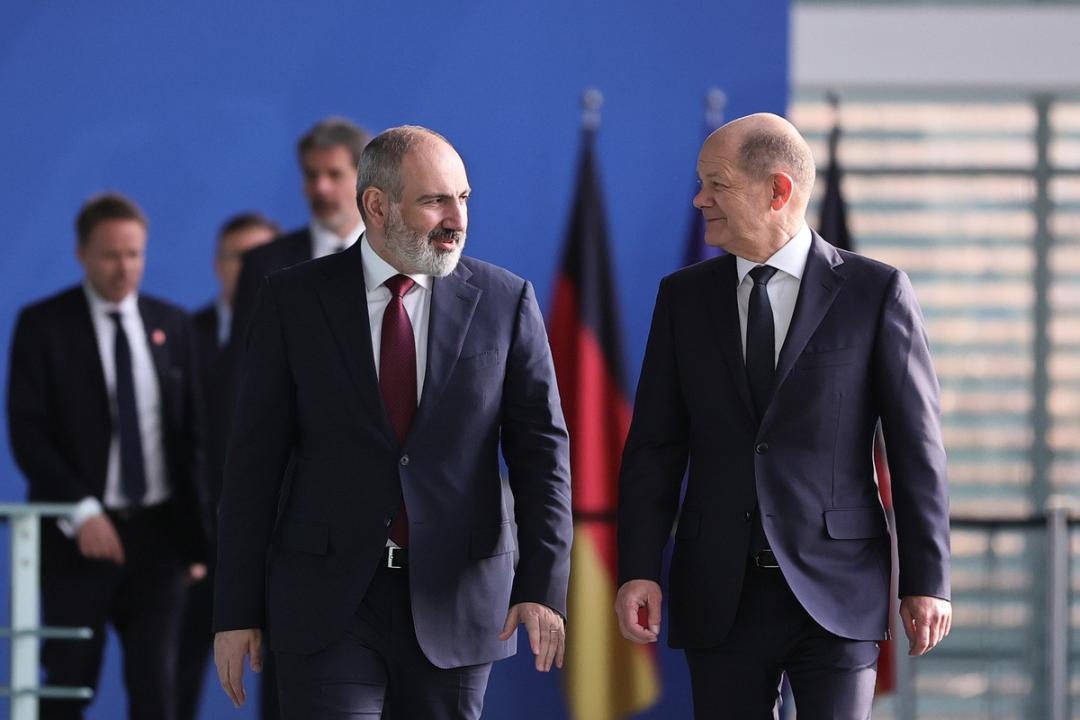
Pashinyan Visits Berlin

Armenian PM Meets German Chancellor Scholz
As the Armenian PM's press office reported, Armenian PM Nikol Pashinyan and German Chancellor Olaf Scholz met in Berlin on March 2. The private conversation was followed by a press conference.
German Chancellor Olaf Scholz expressed concern about the instability on the Armenia-Azerbaijan border and the worsening humanitarian situation in Nagorno-Karabakh. He outlined that the status quo cannot continue, and a long-term solution should be achieved step by step by both sides.
The Chancellor made a remarkable statement, saying that it is necessary to reach a peaceful settlement from the point of view of the territorial integrity of Armenia and Azerbaijan, as well as the self-determination of the citizens of Nagorno-Karabakh. However, this part of the statement was later deleted from the German Federal government’s website.
Armenian PM Pashinyan called the role of the EU monitoring mission on the Armenian-Azerbaijani border vital in ensuring regional security and stability. He thanked all EU member states, including Germany, for responding to Armenia’s request and sending a new, long-term mission.
Later on, the Armenian PM met with the German President Frank-Walter Steinmeier. Nikol Pashinyan and Frank-Walter Steinmeier discussed several issues related to bilateral cooperation. Reference was made to developing cooperation in the political and economic spheres. The German president expressed his readiness to contribute to the strengthening of bilateral ties and emphasized the importance of reforms to develop democracy in Armenia.
Nikol Pashinyan also presented the regional situation at the German Bundestag. He referred to the humanitarian crisis in Nagorno Karabakh, calling for a proper international reaction. Pashinyan expressed grave concern over the situation, adding: “This is just the beginning of escalation in Nagorno-Karabakh, perhaps along the Armenia-Azerbaijani border as well… The blocking of the Lachin Corridor, the so-called “Western Azerbaijan” initiative, is a preparation for large-scale aggression against Armenia.”
Addressing the claims about the “Zangezur corridor," Pashinyan outlined: “There is a point that Armenia should provide a connection between the western regions of Azerbaijan and the Autonomous Republic of Nakhichevan, but there is no point that those routes should be outside of Armenia’s control. That route should operate in the context of opening roads and railways in our region. Armenia is ready to open all communications even today. But every time we try to do this, Azerbaijan says that these routes should not be under the control and legislation of Armenia, which is totally unacceptable to us.”
Pashinyan concluded his speech by emphasizing his commitment to peace agenda and democracy.
As part of his working visit to Germany, the Armenian PM met with the German Eastern Business Association representatives and leading German companies. The issues related to deepening the Armenian-German trade and economic cooperation were discussed. Pashinyan presented the Armenian government’s measures towards improving tax and customs administration and the business environment. He expressed the government’s willingness to expand the involvement of German and European companies in Armenia, adding that large-scale projects in road construction, infrastructure improvement, and several other directions are being implemented in the country with great potential and opportunities for cooperation.
Pashinyan Sums Up His Visit to Germany
Upon ending his two-day working visit to Berlin, Armenian PM Nikol Pashinyan met with representatives of the local Armenian community, the PM Press Office reports.
Pashinyan noted that the visit was overall productive. Even though he avoided drawing premature conclusions, he clarified that the perception of Armenia in the European Union had changed significantly. However, the Armenian PM outlined that amidst the current tectonic shifts in the geopolitical landscape, Armenia still needs to manage its security environment, which is very dangerous and fragile.
“The peace wanted by others does not coincide with the peace wanted by us, and the whole purpose and essence of the diplomatic process should be directed towards this,” Pashinyan stressed.
Armenian PM concluded his remarks by adding that the international attention focused on Armenia and the region signals about possibilities to achieve lasting solutions and peace.
See Also


Simonyan: “Armenia Should Trade with Turkey and Azerbaijan Instead of Closing Borders”

Mirzoyan Meets US Deputy Assistant Secretary Joshua Huck

Azerbaijani President Holds Talks with UAE and German Business Delegations on Economic Cooperation

Grigoryan Confirms Armenia’s Readiness to Dissolve OSCE Minsk Group Upon Peace Treaty Signing

